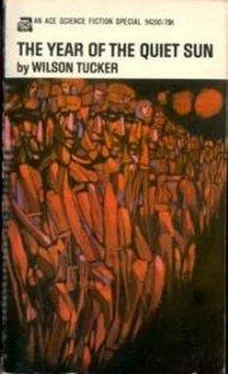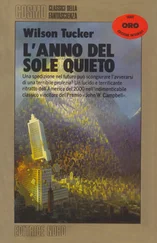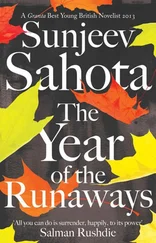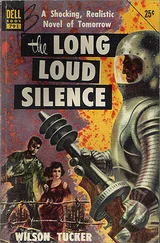Wilson Tucker - The Year of the Quiet Sun
Здесь есть возможность читать онлайн «Wilson Tucker - The Year of the Quiet Sun» весь текст электронной книги совершенно бесплатно (целиком полную версию без сокращений). В некоторых случаях можно слушать аудио, скачать через торрент в формате fb2 и присутствует краткое содержание. Год выпуска: 1970, ISBN: 1970, Издательство: Ace Books, Жанр: Фантастика и фэнтези, на английском языке. Описание произведения, (предисловие) а так же отзывы посетителей доступны на портале библиотеки ЛибКат.
- Название:The Year of the Quiet Sun
- Автор:
- Издательство:Ace Books
- Жанр:
- Год:1970
- ISBN:0-441-94201-6
- Рейтинг книги:3 / 5. Голосов: 1
-
Избранное:Добавить в избранное
- Отзывы:
-
Ваша оценка:
- 60
- 1
- 2
- 3
- 4
- 5
The Year of the Quiet Sun: краткое содержание, описание и аннотация
Предлагаем к чтению аннотацию, описание, краткое содержание или предисловие (зависит от того, что написал сам автор книги «The Year of the Quiet Sun»). Если вы не нашли необходимую информацию о книге — напишите в комментариях, мы постараемся отыскать её.
Won retrospective John W. Campbell Memorial Award in 1976.
Nominated for Nebula Award for Best Novel in 1970.
Nominated for Hugo Award for Best Novel in 1971.
The Year of the Quiet Sun — читать онлайн бесплатно полную книгу (весь текст) целиком
Ниже представлен текст книги, разбитый по страницам. Система сохранения места последней прочитанной страницы, позволяет с удобством читать онлайн бесплатно книгу «The Year of the Quiet Sun», без необходимости каждый раз заново искать на чём Вы остановились. Поставьте закладку, и сможете в любой момент перейти на страницу, на которой закончили чтение.
Интервал:
Закладка:
The nearer of the two wore a heavy coat and a pair of boots taken from the stores; his head and hands were bare and the only weapon he carried was a pair of binoculars also borrowed from the stores. He was tall, thin, lanky — only a few inches less than Chaney’s height, but he lacked the sandy hair and muscular body of his father; he lacked the bronzed skin and the silver filling in his teeth, he lacked the squint of eye that would suggest a seafarer peering into the sun. He lacked the buoyant youthfulness. If the man had possessed those characteristics instead of lacking them, Chaney would say he was looking at Arthur Saltus.
“How do you know my name?”
“You are the only one unaccounted for, sir.”
“And you had my description?”
Softly: “Yes, sir.”
Chaney turned on his knees to face the strangers. He realized they were as much afraid of him as he was of them. When had they last seen another man here?
“Your name is Saltus?”
A nod. “Arthur Saltus.”
Chaney shifted his gaze to the woman who stood well behind the man. She stared at him with a curious mixture of fascination and fright, poised for instant flight. When had she last seen another man here?
Chaney asked: “Kathryn?”
She didn’t respond, but the man said: “My sister.”
The daughter was like the mother in nearly every respect, lacking only the summer tan and the delta pants. She was bundled in a great coat against the chill and wore the common boots that were much too large for her feet. A pair of binoculars hung around her neck: he felt closely observed. Her head was bare, revealing Katrina’s great avalanche of fine brown hair; her eyes were the same soft — now frightened — delightful shade. She was a small woman, no more than a hundred pounds when free of the bulky boots and coat, and gave every appearance of being quick and alert. She also gave the appearance of being older than Katrina.
Chaney looked from one to the other: the two of them, brother and sister, were years beyond the people he had left in the past, years beyond their parents.
He said at last: “Do you know the date?”
“No, sir.”
Hesitation, then: “I think you were waiting for me.”
Arthur Saltus nodded, and there was the barest hint of affirmation from the woman.
“My father said you would be here — sometime. He was certain you would come; you were the last of the three.”
Surprise: “No one else, after us?”
“No one.”
Chaney touched the grave a last time, and their eyes followed his hand. He had one more question to ask before he would risk getting to his feet.
“Who lies here?”
Arthur Saltus said: “My father.”
Chaney wanted to cry out: how? when? why? but embarrassment held his tongue, embarrassment and pain and depression; he bitterly regretted the day he’d accepted Katrina’s offer and stepped into this unhappy position. He climbed to his feet, avoiding sudden moves that could be misinterpreted, and was thankful he hadn’t taken a picture of the grave — thankful he wouldn’t have to tell Katrina, or Saltus, or Seabrooke, what he’d found here. He would make no mention of the grave at all.
Standing, Chaney searched the area carefully, looking over their heads at the weedy garden, the parking lot, the company street beyond the lot and all of the station open to his eye. He saw no one else.
Sharp question: “Are you two alone here?”
The woman had jumped at his tone and seemed about to flee, but her brother held his ground.
“No, sir.”
A pause, and then: “Where is Katrina?”
“She is waiting in the place, Mr. Chaney.”
“Does she know I am here?”
“Yes, sir.”
“She knew I would ask about her?”
“Yes, sir. She thought you would.”
Chaney said: “I’m going to break a rule.”
“She thought you would do that, too.”
“But she didn’t object?”
“She gave us instructions, sir. If you asked, we were to say that she told you where she would wait.”
Chaney nodded his wonder. “Yes — she did that. She did that twice.” He moved back along the path by way of the cistern and they carefully retreated before him, still uncertain of him. “Did you do this?”
“My father and I dug it, Mr. Chaney. We had your book. The descriptions were very clear.”
“I’d tell Haakon, if I dared.”
Arthur Saltus stepped aside when they reached the parking lot and allowed Chaney to go ahead of him. The woman had darted off to one side and now kept a prudent distance. She continued to stare at him, a stare that might have been rude under other circumstances, and Chaney was very sure she’d seen no other man for too many years. He was equally certain she’d never seen a man like him inside the protective fence: that was her apprehension.
He ignored the rifle resting in the cart.
Brian Chaney fitted the keys into the twin locks and swung the heavy door. His two lanterns rested on the top step, and as before a rush of musty air fell out into the waning afternoon sunlight. Chaney paused awkwardly on the doorsill wondering what to say — wondering how to say goodbye to these people. Only a damned fool would say something flippant or vacuous or inane; only a damned fool would utter one of the meaningless clichés of his age; but only a stupid fool would simply walk away from them without saying anything.
He glanced again at the sky and at the golden fleece about the sun, at the new grass and leaves and then at the aging mound of yellow clay. At length his gaze swung back to the man and woman who waited on him.
He said: “Thank you for trusting me.”
Saltus nodded. “They said you could be trusted.”
Chaney studied Arthur Saltus and almost saw again the unruly sandy hair and the peculiar set to his eyes — the eyes of a man long accustomed to peering against the sun-bright sea. He looked long at Kathryn Saltus but could not see the transparent blouse or the delta pants: on her those garments would be obscene. Those garments belonged to a world long gone. He searched her face for a moment too long, and was falling head over heels when reality brought him up short.
Harsh reality: she lived here but he belonged back there. It was folly to entertain even dreams about a woman living a hundred years ahead of him. Hurtful reality.
His conscience hurt when he closed the door because he had no more to say to them. Chaney turned away and went down the steps, putting behind him the quiet sun, the chill world of 2000-plus, the unknown survivors beyond the fence who had fled in terror at sight and sound of him, and the half-familiar survivors within the fence who were sharp reminders of his own loss. His conscience hurt, but he didn’t turn back.
The time was near sunset on an unknown day.
It was the longest day of his life.
SEVENTEEN
The briefing room was subtly different from that one he’d first entered weeks or years or centuries ago.
He remembered the military policeman who’d escorted him from the gate and then opened the door for him; he remembered his first glance into the room — his lukewarm reception, his tardy entrance. He’d found Kathryn van Hise critically eyeing him, assessing him, wondering if he would measure up to some task ahead; he’d found Major Moresby and Arthur Saltus playing cards, bored, impatiently awaiting his arrival; he’d found the long steel table positioned under lights in the center of the room — all waiting on him.
He had given his name and started an apology for his tardiness when the first hurtful sound stopped him, chopped him off in mid-sentence and hammered his ears. He had seen them turn together to watch the clock: sixty-one seconds. All that only a week or two ago — a century or two ago — before the bulky envelopes were opened and a hundred flights of fancy loosed. The long journey from the Florida beach had brought him twice to this room, but this time the lantern poorly illuminated the place.
Читать дальшеИнтервал:
Закладка:
Похожие книги на «The Year of the Quiet Sun»
Представляем Вашему вниманию похожие книги на «The Year of the Quiet Sun» списком для выбора. Мы отобрали схожую по названию и смыслу литературу в надежде предоставить читателям больше вариантов отыскать новые, интересные, ещё непрочитанные произведения.
Обсуждение, отзывы о книге «The Year of the Quiet Sun» и просто собственные мнения читателей. Оставьте ваши комментарии, напишите, что Вы думаете о произведении, его смысле или главных героях. Укажите что конкретно понравилось, а что нет, и почему Вы так считаете.












